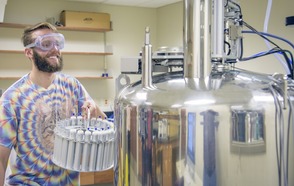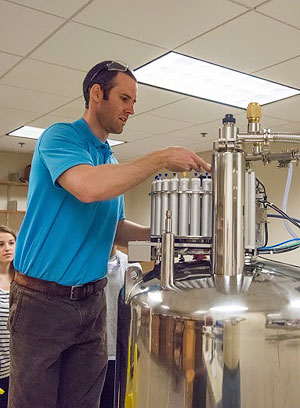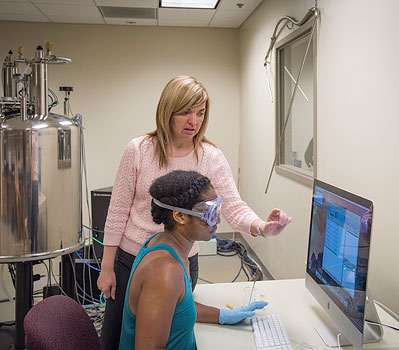News & Media
New Spectrometer Giving Students Professional-Level Experience

April 30, 2015
A new Nuclear Magnetic Resonance (NMR) spectrometer obtained by the Department of Chemistry and Biochemistry means that science students at DePauw have the uncommon opportunity to work on professional-level research equipment, beginning in their freshman year.
“It’s an instrument just like Eli Lilly and Company, Pfizer or any other big drug company uses. Students are learning skills that they can apply to what they do after they graduate – jobs, graduate school, professional school or medical school,” says Daniel F. Scott, assistant professor of biochemistry and chemistry. The spectrometer uses the magnetic properties of atomic nuclei to determine the physical and chemical properties of atoms or the molecules in which they are contained.
 First-year students gain a significant amount of experience working on the NMR in a class, Structures and Properties of Organic Molecules, which is required for all students majoring in biochemistry, biology and chemistry, as well as for pre-med students. “For example, I give students an unknown sample in a vial, and they’re using the spectrometer and other techniques to identify what it’s composed of,” Scott, pictured left, says. “Students work at the molecular level to identify all the atoms and how they’re connected.”
First-year students gain a significant amount of experience working on the NMR in a class, Structures and Properties of Organic Molecules, which is required for all students majoring in biochemistry, biology and chemistry, as well as for pre-med students. “For example, I give students an unknown sample in a vial, and they’re using the spectrometer and other techniques to identify what it’s composed of,” Scott, pictured left, says. “Students work at the molecular level to identify all the atoms and how they’re connected.”
It’s good practice for students not only for gathering data, but also in interpreting the results. Science faculty members work with students on the spectrometer in entry-level classes all the way through specialized senior projects.
“At many colleges, students might not even see a Nuclear Magnetic Resonance spectrometer until they are juniors or seniors, then they might only use it once or twice,” Scott says. “Other schools can’t always do what we have the capability to do. DePauw freshmen learn the fundamentals of the machine, and in upper-level classes they are prepared to do more specialized experiments.”
The JEOL 400 MHz Nuclear Magnetic Resonance spectrometer, cylindrical in shape, stands approximately 7 feet tall and is about two feet wide. According to Jeffrey A. Hansen, professor and chair of chemistry and biochemistry, the instrument features a multinuclear probe, auto tuning module, variable temperature capability, and a 24-place automatic sample changer. The new instrument will be used by faculty in the department for research in organic and organometallic synthesis, drug discovery and delivery, reverse micelles and plant metabolomics.
 The spectrometer will significantly augment student/faculty collaborative research and research training, Hansen says. Specific projects planned include: studies of enantioselectivity in an aldol/epoxidation reaction, metabolomics study of the effects of climate change on plants, discovery of new drug candidates related to mithramycin and nanotechnology-based drug delivery, characterization of metal aggregate properties in ionic liquids, and study of water-lipid interfaces using reverse micelles.
The spectrometer will significantly augment student/faculty collaborative research and research training, Hansen says. Specific projects planned include: studies of enantioselectivity in an aldol/epoxidation reaction, metabolomics study of the effects of climate change on plants, discovery of new drug candidates related to mithramycin and nanotechnology-based drug delivery, characterization of metal aggregate properties in ionic liquids, and study of water-lipid interfaces using reverse micelles.
DePauw University has a rich tradition of training the next generation of scientists, including Percy Lavon Julian ’20, an internationally known chemist and founder of Julian Laboratories, whose research led to the total synthesis of physostigmine, a treatment for glaucoma; synthesis of male and female hormones from soybean oil; a fire-fighting foam; production of large quantities of synthetic cortisone; and many other discoveries. Ferid Murad ’58, received the Nobel Prize in Medicine in 1998 for his discovery of the role of nitric oxide in the cardiovascular system, and William F. Carroll Jr. ’73 is vice president at Occidental Chemical Corp and past board chairman of the American Chemical Society.
Contact Us
Communications & Marketing

Bob Weaver
Senior Director of Communications
- bobweaver@depauw.edu
- (765) 658-4286
-
201 E. Seminary St.
Greencastle, IN 46135